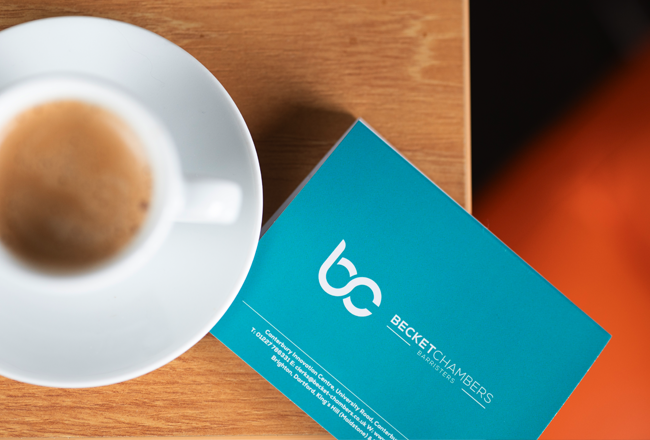
As Becket Chambers prepares to celebrate 30 years of operating as an independent barristers’ chambers, later in September this year, I am taking this opportunity to reflect on an issue which has dominated headlines recently and doubtless will continue to do so for some considerable time in the future, the cab rank rule.
Simply put, to quote from the latest press release on the 24th of March 2023 by Mark Neale, the Director General of the Bar Standards Board (“BSB”):
“If a self-employed barrister receives instructions from a professional client, and the instructions are appropriate taking into account their experience, seniority and area of practice, they are generally obliged to accept those instructions irrespective of the identity of the client, the nature of their case and any belief they may have as to the client’s character or cause. This rule, which is known as the “cab-rank” rule is designed to ensure that everyone can have access to legal advice”. This is to be found at the BSB website at: https://www.barstandardsboard.org.uk/resources/press-releases/statement-by-mark-neale-the-director-general-of-the-bar-standards-board-concerning-the-cab-rank-rule.html.
Since the publication of an article of mine in the Times on the 5th of September 2000, entitled “Fairness is the key”, in defence of the cab rule, in the intervening 23 years, the cab rank rule has continued to be a mechanism whereby access to justice for all has been driven forward.
In that article, I argued that: “The cab-rank rule is one of the Bar’s greatest strengths. It is still one of the best mechanisms of ensuring justice for all……The time has come to educate the public that in spite of sometimes defending guilty people, the overriding duty of all lawyers – barristers, solicitors and solicitor advocates alike – is their duty not to mislead or deceive the court. The public has to appreciate that when lawyers take on cases, they have an ethical duty to do their very best for their client. This also means adhering to their professional codes…….It also has to be made crystal clear that when lawyers take on morally repugnant or unpopular cases, they are acting as professionals. They take on these cases because they are committed to the concept of fairness, on which the cab-rank rule is grounded. They do not necessarily identify with their client’s causes. Some lawyers have paid with their lives for this public misconception. In addition to the cab-rank rule, the other great strength of the Bar is its independence………It is this independence that enables members in the same set to appear against one another without the risk of a conflict of interest between clients”.
Since 2000, the BSB has revised the cab rank rules and contractual terms for barristers. The most up to date rules are to be found at rules C29-C30 of version 4.6 of the BSB handbook as at 31st December 2020, to be found on the BSB website at: https://www.barstandardsboard.org.uk/for-barristers/bsb-handbook-and-code-guidance/the-bsb-handbook.html.
Rules C29 and C30 are as follows:
“Rules C29-C30 – The cab rank rule Rules rC29: If you receive instructions from a professional client, and you are: .1 a self-employed barrister instructed by a professional client; or .2 an authorised individual working within a BSB entity; or .3 a BSB entity and the instructions seek the services of a named authorised individual working for you,
and the instructions are appropriate taking into account the experience, seniority and/or field of practice of yourself or (as appropriate) of the named authorised individual you must, subject to Rule rC30 below, accept the instructions addressed specifically to you, irrespective of: .a the identity of the client; .b the nature of the case to which the instructions relate; .c whether the client is paying privately or is publicly funded; and .d any belief or opinion which you may have formed as to the character, reputation, cause, conduct, guilt or innocence of the client.
rC30: The cab rank Rule rC29 does not apply if: .1 you are required to refuse to accept the instructions pursuant to Rule rC21; or .2 accepting the instructions would require you or the named authorised individual to do something other than in the course of their ordinary working time or to cancel a commitment already in their diary; or .3 the potential liability for professional negligence in respect of the particular matter could exceed the level of professional indemnity insurance which is reasonably available and likely to be available in the market for you to accept; or .4 you are a King’s Counsel, and the acceptance of the instructions would require you to act without a junior in circumstances where you reasonably consider that the interests of the client require that a junior should also be instructed; or .5 accepting the instructions would require you to do any foreign work; or .6 accepting the instructions would require you to act for a foreign lawyer (other than a European lawyer, a lawyer from a country that is a member of EFTA, a solicitor or barrister of Northern Ireland or a solicitor or advocate under the law of Scotland); or .7 the professional client: .a is not accepting liability for your fees; or .b represents, in your reasonable opinion, an unacceptable credit risk; or .c is instructing you as a lay client and not in their capacity as a professional client; or .8 you have not been offered a proper fee for your services (except that you shall not be entitled to refuse to accept instructions on this ground if you have not made or responded to any fee proposal within a reasonable time after receiving the instructions); or .9 except where you are to be paid directly by (i) the Legal Aid Agency as part of the Community Legal Service or the Criminal Defence Service or (ii) the Crown Prosecution Service: .a your fees have not been agreed (except that you shall not be entitled to refuse to accept instructions on this ground if you have not taken reasonable steps to agree fees within a reasonable time after receiving the instructions); .b having required your fees to be paid before you accept the instructions, those fees have not been paid; .c accepting the instructions would require you to act other than on (A) the Standard Contractual Terms for the Supply of Legal Services by Barristers to Authorised Persons 2020 as published on the Bar Council’s website; or (B) if you publish standard terms of work, on those standard terms of work”.
However, rules C29 and C30 cannot be read in isolation and clearly should be read with the rest of the rules and the Handbook and in particular, rule C28 which is the requirement not to discriminate which reads as follows:
“rC28 :You must not withhold your services or permit your services to be withheld:
.1 on the ground that the nature of the case is objectionable to you or to any section of the public;
.2 on the ground that the conduct, opinions or beliefs of the prospective client are unacceptable to you or to any section of the public;
.3 on any ground relating to the source of any financial support which may properly be given to the prospective client for the proceedings in question”.
In addition, the guidance to rule C28 of the Handbook is informative and reads as follows:
Guidance to Rule C28 Guidance
gC88
“As a matter of general law you have an obligation not to discriminate unlawfully as to those to whom you make your services
available on any of the statutorily prohibited grounds such as gender or race. See the Equality Rules in the BSB Handbook and the
BSB’s website for guidance as to your obligations in respect of equality and diversity. This rule of conduct is concerned with a
broader obligation not to withhold your services on grounds that are inherently inconsistent with your role in upholding access to
justice and the rule of law and therefore in this rule “discriminate” is used in this broader sense. This obligation applies whether or
not the client is a member of any protected group for the purposes of the Equality Act 2010. For example, you must not withhold
services on the ground that any financial support which may properly be given to the prospective client for the proceedings in
question will be available as part of Criminal Legal Aid and Civil Legal Aid”.
On the 26th of May 2023, the Bar Council released the latest press release which can be viewed on the Bar Council website: https://www.barcouncil.org.uk/resource/cab-rank-rule-statement-of-the-four-bars.html, as follows:
“Following a meeting of the Four Bars (England and Wales, Ireland, Northern Ireland, and Scotland) in Dublin last week and in advance of the forthcoming Four Jurisdictions Conference in Belfast in June, the leadership of the Four Bars have issued the following joint statement on the cab rank rule.
The cab rank rule is a bedrock obligation for the independent referral Bar. The rule means that barristers cannot discriminate between clients, and that they must take on any case provided that it is within their competence and they are available and appropriately remunerated.
The cab rank rule promotes access to justice. It means that clients will not be deprived of the advocate of their choice because the client or the client’s cause could be seen as objectionable or unpopular. People with unpopular causes or accused of serious offences do not need the additional challenge of having first to persuade a lawyer to take them on.
Barristers do not choose their clients, nor do they associate themselves with their clients’ opinions or behaviour by virtue of representing them.
The independent referral bars of England & Wales, Ireland, Northern Ireland, and Scotland collectively re-affirm our commitment to the cab rank rule. It:
- Promotes access to justice
- Recognises that it is for judges and juries to decide and to judge, and that passing judgment is not the role of advocates
- Imposes an obligation on the independent referral bar to accept work even from those with whom we profoundly disagree, and of whom we profoundly disapprove
- Means that our role and duty as advocates is, and is only, to advise, and then to represent, always subject to our duties to the court.
Nick Vineall KC, Chair, Bar Council of England & Wales
Sara Phelan SC, Chair, The Bar of Ireland
Moira Smyth KC, Chair, The Bar of Northern Ireland
Roddy Dunlop KC, Dean, Faculty of Advocates”.
In light of the Four Bars’ statement and re-affirmation of its collective commitment to the cab rank rule, there is not much left to say save, a strong independent Bar matters. Access to justice matters. One of the ways of driving this forward is via the cab rank rule.
